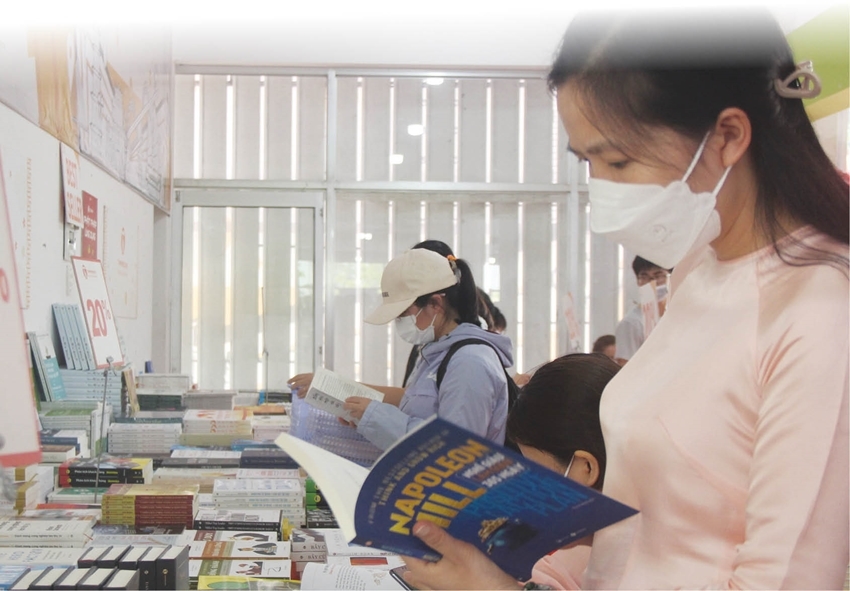    |
 |
| Students at Thuy Bieu Primary School (Hue City) participating in reading activities at the school. Photo by: HONG THANG |
When it comes to reading culture, it is really important to determine how much people read, what they read and remember, and how they apply it in learning and in practice. Reading culture, if promoted, will affirm its positive role in building a learning society, building a foundation of people’s knowledge, and contributing to national development. A country with poor culture manifests itself in low literacy levels, the absence of intellectuals and the limited number of readers.
We should remember that the essence of culture is spiritual cultivation – derived from the Latin word cultus, meaning sowing – and is the continuation of the process of inheriting social traditions. That spiritual cultivation is a process to shape a community, and a nation.
Vietnamese culture represents the most unique and basic features, identifying and distinguishing itself from the culture of other lands and regions. A Vietnamese voice, a lullaby, a communal house, a bowl of pho, an ao dai lap, etc., makes up of the cultural identity of Vietnam.
Father Léopold Cadière, editor of the famous BAVH (Bulletin des Amis du Vieux Hué, meaning “Friends of Hue Ancient Capital”) in the early twentieth century, had a special affection for the Vietnamese people: “Having studied Vietnamese beliefs, religious rituals and customs, I fall in love with Vietnamese people. I love the Vietnamese because they are brilliantly intelligent and quick-witted…” That sentiment was so deep and sacred that Léopold Cadière had a wish: “I have given all my life to this country, so that I can stay and die here.”
    |
 |
| Reading culture, if promoted, will affirm its positive role in building the intellectual foundation |
Throughout the history, however, not everyone respects Vietnamese culture from the bottom of their soul. In the course of national history, a phenomenon that makes me feel bitter is the destruction and distortion of culture. What once regulated the independent existence of our country as well as created the vitality of our nation and the stature of the Vietnamese people has been destroyed many times, most directly through Vietnamese people burning books by order of the Ming Dynasty (China).
When the Ming Dynasty invaded our country in the 15th century, they directly ordered the invading generals to burn and destroy any books or documents that came in a vision on the way to advance. They even sent troops to smash any stele engraved with words to erase cultural traces and to burn books to prevent children from learning.
In particular, they also commanded insightful minds to search and collect all the historical and books written by the Vietnamese to destroy. Even more sinisterly, the Ming Dynasty directed people to bring Chinese books to replace the books they had taken away in order to spread their ideas and culture, for the purpose of assimilating our people and completely erasing our ethnic origin. It was a sinister conspiracy, leaving many serious consequences.
Therefore, owning great works and must-read books for many generations is the preservation of the national culture and the absorption of spiritual values right on each word. Books are a means of knowledge as well as a tool to develop a knowledge society and a learning society.
Because of the great meaning and value of books, bookmakers and reading culture, from October 25th to November 16th , 1995, UNESCO selected April 23rd every year as “World Book and Copyright Day”, for honoring authors who have made many contributions to the cultural and social progress of mankind and honoring reading culture.
A notable event is that in 2014, the Prime Minister issued Decision No. 284/QD-TTg on Vietnam Book Day, taking April 21st as Vietnam Book Day, showing our vision of building a reading culture.
The Decision clearly states three purposes in Article 2, the most important one of which is: “To encourage and develop the reading movement in the community, to raise people’s awareness of the great meaning of reading books in the community and the importance of reading books for improving knowledge and skills, developing thinking, educating and training human personality”.
That purpose is very clear, showing the vision of the managers about reading culture, especially improving knowledge and skills, which are essential criteria for a knowledge society, especially young people. Besides, the development of thinking, education and training of human personality is also very necessary, showing the tremendous benefits of reading.
The French mathematician Rene Descartes said: “Reading a good book is like conversing with the greatest minds of centuries gone by.”
The event of World Reading Day in Vietnam is becoming a cultural activity of bookaholics that needs to be maintained and promoted. And, it should also be noted that reading is not just a day, it’s not a movement. It’s a habit, a self-discipline, an awareness of each individual.
Many cultists and managers are interested in reading culture and its importance in the structure of our society. It is a cultural practice to seek knowledge, information, and healthy entertainment through the written words and works that have been published in an authentic and quality manner.
Books and reading culture have contributed to preserving national and ethnic culture; and, developing personal capacity through language can be used as a tool to connect, propagate and preserve immutable values throughout millions of years. Read books, and the whole world will open to you.